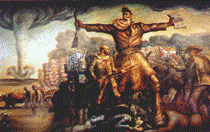History, Department of

James A. Rawley Graduate Conference in the Humanities
Date of this Version
April 2008
Document Type
Article
Abstract
Although many scholars study state history and most states have long-running history magazines, few write explicitly about state identity. This is surprising, given that many people identify with their state as often as they identify with their region or nation. This presentation will encourage research into this area with an investigation of how Montanans used the 1894 election for the state capital to describe who and what they felt best represented their state. Based on research into newspapers and political propaganda for both towns competing in the election for the state capital, this presentation investigates Montanans’ ideas about immigration, labor, and good citizenship in the late nineteenth century. It argues that the state’s Populist movement and immigration debates (particularly surrounding the Irish and Chinese populations) should figure as prominently in descriptions of late-nineteenth century Montana as the battles between industrial titans that often dominate historians’ narratives. Indeed, this election provided Montanans with a forum through which to both express their concerns about the “native”ness of the state’s new mine-working residents and debate the value of Populist and labor union ideas, particularly the value of manual labor. Concerns about what made both a good individual citizen (and his/her relationship to unionism) and a good corporate citizen (particularly in relation to the powerful Anaconda Mining Company and the Northern Pacific Railroad) shaped election rhetoric. By revealing a formative moment in the development of Montana’s political culture, a culture that still retains many elements of its Populist heritage, this presentation suggests how people “imagine communities” at the level of the state.


Comments
Paper presented at the 3rd Annual James A. Rawley Conference in the Humanities — Imagining Communities: People, Places, Meanings. Lincoln, Nebraska, April 12, 2008. Sponsored by the University of Nebraska–Lincoln History Graduate Students’ Association. Copyright © 2008 Brian Leech.